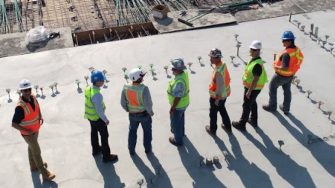Senior Executive Attitudes to Risk
The role of corporate social responsibility and senior executive incentive schemes in corporate governance and organisational safety performance
The role of corporate social responsibility and senior executive incentive schemes in corporate governance and organisational safety performance

Safety in the construction sector is an important part of organisational performance. Workplace injuries and large-scale accidents bring personal and organisational costs and expose construction companies to commercial, reputational, and legal risks. A concern with organisational safety performance has been a part of corporate governance for some time. In recent years, the notion of corporate social responsibility (CSR) has been increasingly emphasised in corporate governance, including in the construction industry. Construction companies have a significant impact on the communities they build, with residential building design and construction influencing residents’ health, safety, and social life. Recent building failures have raised concern about ethical behaviours, occupant safety and the social impact of adverse events, e.g., the 2014 Docklands building fire (Melbourne, Australia), the 2017 Grenfell Tower fire (UK), the 2018 Opal and 2019 Mascot Towers (Sydney, Australia). From a CSR perspective, executive accountability for corporate failings with a broader social impact, such as Rio Tinto’s destruction of sacred Aboriginal sites, has brought senior executive incentive schemes into the spotlight.
However, these debates do not consider corporate governance decision-making, the role of Boards of Directors and specifically the influence of senior executive incentive schemes or any discord with stated CSR objectives. Despite research into accident causation and strategies to improve safety, little is known about the interactions of different corporate governance processes, the interactions between commitments to CSR and executive incentive schemes, and the impact of these on safety and other social issues.
This research aims to raise awareness of addressing safety criteria in executive incentive schemes, and to develop more robust performance indicators. As the theoretical underpinning of CSR in construction is currently underdeveloped, this research will contribute to an expanded theoretical understanding. Initially focussed on the Australian construction sector, the long-term objective is to consider whether lessons and good practices can be shared internationally. This includes with industries where incentives can influence decision-making, for example when products with the potential to cause public harm, such as pharmaceuticals, are released to the market.
Dr Rita Peihua Zhang (RMIT)
Corporate Governance, Incentive Schemes, and Safety Performance in the Construction Industry In: Chan, P W and Neilson, C J (Eds) Proceeding of the 33rd Annual ARCOM Conference, 4-6 September 2017, Cambridge, UK, Association of Researchers in Construction Management, 380-388.
Rita Peihua Zhang and Vanessa McDermott
Constructing safety: investigating senior executive long-term incentive plans and safety objectives in the construction sector – Construction Management and Economics
Vanessa McDermott, Rita Peihua Zhang, Andrew Hopkins, Jan Hayes